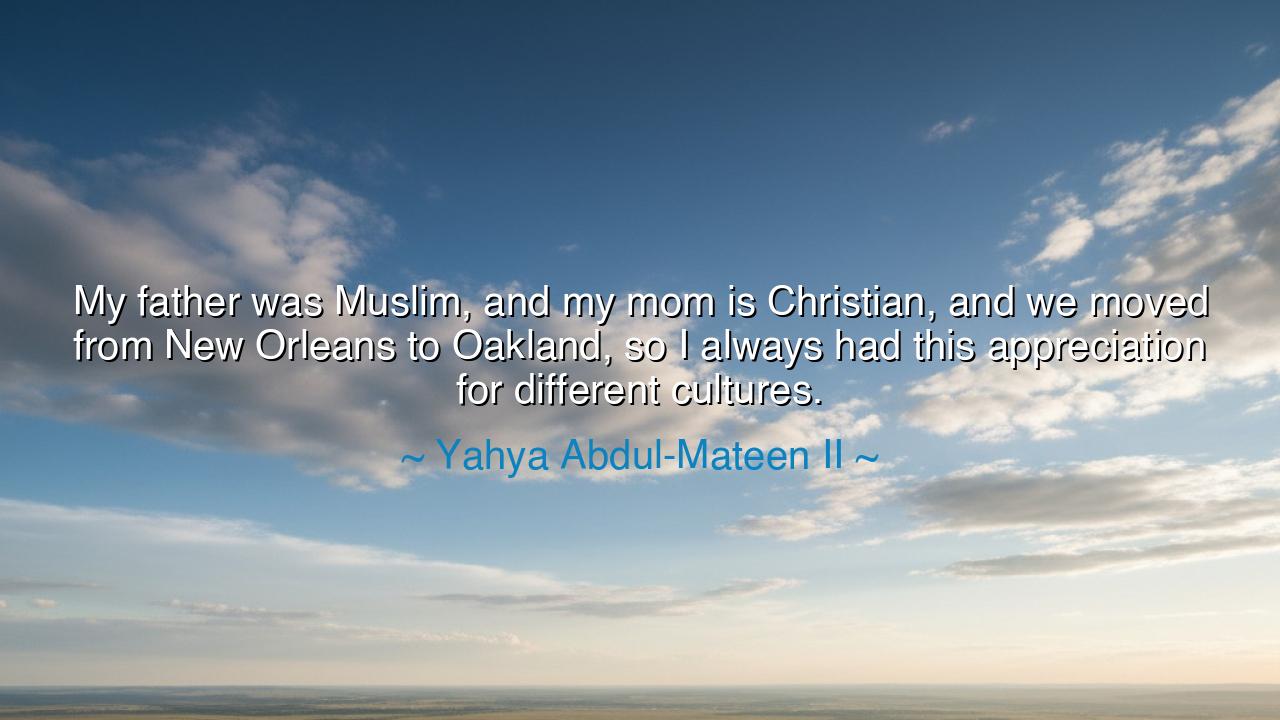
My father was Muslim, and my mom is Christian, and we moved from
My father was Muslim, and my mom is Christian, and we moved from New Orleans to Oakland, so I always had this appreciation for different cultures.






The words of Yahya Abdul-Mateen II — “My father was Muslim, and my mom is Christian, and we moved from New Orleans to Oakland, so I always had this appreciation for different cultures.” — are more than a recollection of family and faith; they are a hymn to the beauty of diversity, the sacred art of harmony among difference. In these few lines, one hears the music of two worlds meeting — the East and the West, the Crescent and the Cross, the sacred rhythm of one life shaped by many traditions. It is a truth as old as civilization itself: that the soul grows wiser when it learns to live among many fires without burning in any one of them.
To be the child of two faiths is to stand on a bridge between worlds — a place both delicate and powerful. Yahya’s Muslim father and Christian mother did not merely give him life; they gave him a map of humanity, teaching him that no single path holds all the light. In his words, we hear the echo of the ancients, who knew that truth has many languages, and that wisdom often blooms at the crossroads. His appreciation for different cultures is not academic — it is lived, breathed, and carried within him like a sacred inheritance of understanding.
When he speaks of New Orleans and Oakland, he is not only naming cities, but invoking two spiritual realms of America — one soaked in jazz and soul, the other pulsing with movement and change. New Orleans, with its Creole heart and Catholic bells, taught him rhythm and history; Oakland, with its defiance and activism, taught him identity and pride. Between them, he found the melody of coexistence — the understanding that greatness comes not from purity, but from mixture. The ancients would say he was tempered like steel, made strong by fire and water alike.
Throughout history, those born between faiths or cultures have often become bridges for the world. Think of Akbar the Great, the Mughal emperor of India, who welcomed all religions to his court and sought a divine faith that united rather than divided. Or of Frederick Douglass, the son of an enslaved woman and a white man, who carried within him the voices of both the oppressed and the powerful — and used that duality to speak with unmatched moral clarity. Like them, Yahya’s life bears witness to the ancient truth: that understanding begins where certainty ends, and that peace is found not in sameness, but in reverence for difference.
The beauty of this quote lies in its humility. Yahya does not claim to have solved the riddle of faith or culture; he simply says he has appreciation. In that word lies a world of wisdom. To appreciate is not to conquer or convert, but to behold — to look upon the unfamiliar and say, “You too carry the divine.” It is an act of quiet reverence, a way of seeing the sacred thread that connects mosque and church, gospel and call to prayer, jazz and poetry, mother and father. It is a wisdom that the modern world, too often divided by tribe and ideology, desperately needs to remember.
Such appreciation is the soil of empathy. It teaches us to listen before we speak, to see before we judge, to honor before we question. Yahya’s upbringing reminds us that identity is not a wall but a window — that when we open ourselves to the stories of others, we find parts of our own reflected back. This is the essence of civilization itself: not the domination of one truth over another, but the shared dance of many truths in the same light.
And so, let us draw from this the lesson of unity through diversity. Seek not the comfort of sameness, but the wisdom of contrast. Learn from those whose faith differs from yours, whose ancestors sang different songs. For every culture carries a piece of the eternal, and every person you meet bears a fragment of the divine mystery. Let your heart, like Yahya’s, hold an appreciation for different cultures, for in doing so, you honor the full tapestry of creation.
Thus, remember: the world does not ask us to choose between East and West, or between faiths, or between histories. It asks only that we love deeply enough to understand them all. The child of two worlds becomes the teacher of many. And in this, Yahya Abdul-Mateen II speaks not only for himself — he speaks for all who walk the bridge between differences, carrying the eternal message that love, when broadened by understanding, becomes the highest form of wisdom.






AAdministratorAdministrator
Welcome, honored guests. Please leave a comment, we will respond soon